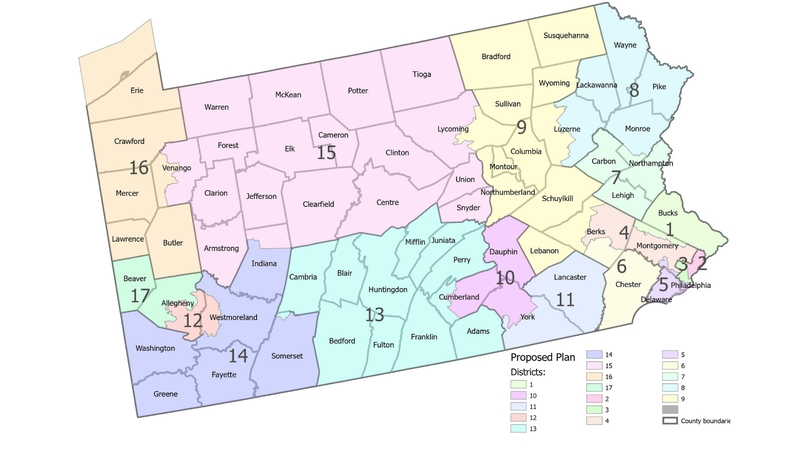
PHILADELPHIA (AP/KYW Newsradio) — Pennsylvania’s highest court broke a partisan deadlock Wednesday over a new map of congressional districts by selecting new boundaries that broadly adhere to the outlines of current districts, even as the state loses one seat because of sluggish population growth.

The Democratic-majority state Supreme Court in a 4-3 decision picked a 17-district map, the Carter Map, that had been proposed by a group of Democratic-aligned voters who sued last year in an effort to get the court involved.
It is unlikely to create a big shift in the makeup of the congressional delegation, as the state loses a seat, going from 18 to 17, to account for relatively stagnant population growth in census findings over the past decade, particularly in rural white areas predominantly represented by Republicans.
The map provides eight Republican-leaning districts, six Democratic-leaning districts and three closely divided districts, according to an analysis by FiveThirtyEight, a website that focuses on opinion poll analysis, politics and other topics.
View the Supreme Court order below:
View a detailed outline of the Carter Map below:
Backers of the Carter Map say 86% of Pennsylvania residents would stay in their current district.
The map selection process ended up in the high court after the Legislature and governor were unable to come to an agreement.
Pennsylvania’s delegation is currently split evenly, nine Republicans and nine Democrats, in a state where registered Democrats outnumber Republicans by 4 million to 3.4 million.
Four of five Democrats on the court formed the majority in Wednesday's decision, while one Democrat, Justice Debra Todd, sided with the court's two Republicans in opposing it.
In picking the new map, the justices also rejected a lower court judge's recommendation of a map backed by Republican lawmakers that Democrats had opposed.
It lumps two Republican incumbents — U.S. Reps. Glenn Thompson and Fred Keller — into a sprawling northern district, and draws two Pittsburgh area districts where there will be no sitting incumbents running for another term.
The court also adjusted the petition gathering schedule but left the May 17 primary date intact for congressional races. However, the court on Wednesday also issued an order that suspended the primary election calendar for state legislative candidates, because new state House and Senate maps are being challenged in court.

